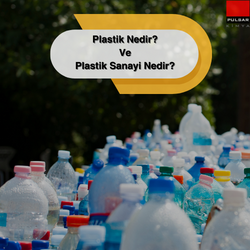What is Plastic?
Plastic is the general name of the polymers that make up the structure of many of the materials. Plastics are used for various purposes because they are durable, flexible and inexpensive. Plastics are produced by the petrochemical industry in very different ways, often from components such as polyethylene, polypropylene, polystyrene. Its forms include bottles, caps, cans or sundries. In addition, plastic is used in electronic devices, cars, household goods. However, the longevity of plastics creates serious environmental problems. Plastics degrade slowly in nature and cannot dissolve naturally. Because they can remain in nature for very long periods, they can become harmful to seas, forests and other ecosystems. In conclusion, although plastics are a very useful and flexible material for many industries, their impact on the environment is worrisome. Therefore, it is important to reduce the use of plastic and increase recycling ways. In addition, the use of alternative materials and the search for innovative solutions are of great importance.
Refinery and Petrochemical Technology
Refinery and petrochemical technology is the process of processing natural resources such as oil and gas. During this process, various components of oil and gas are separated and many products such as gasoline, coal, plastics are produced. This process is carried out in refineries.
Refineries are facilities used to separate the various components of oil and gas. In these plants, oil and gas is processed with different techniques such as temperature, pressure and chemical treatments. As a result of these processes, different products such as gasoline, diesel, solid fuels, LPG are obtained.
Petrochemical technology, on the other hand, produces many chemical products such as plastics, rubber, paints, detergents, drugs, using the components obtained in refineries. For example, polyethylene plastic is produced using the ethylene components of oil and gas.
Refinery and petrochemical technology plays an important role around the world. Thanks to these technologies, various components of natural resources such as oil and gas are obtained and used in many different sectors. However, refinery and petrochemical technology also pose environmental problems. For example, wastes are generated during refinery and petrochemical production and these wastes can be harmful to the environment. Therefore, refining and petrochemical technology must be managed in a reversible way.
What are Plastic Wastes?
Plastic waste refers to wastes that pose a great danger to the environment and cause poisoning of natural resources. Plastic wastes can remain in nature for many years for various reasons and can affect natural ecosystems.
There are several types of plastic waste. The most common among them are; bags, bottles, boxes, packaging materials, toys, disposables and parts of electronic devices. Most of these wastes can be reused or recycled through recycling. However, some plastic waste is not suitable for recycling.
The effects of plastic waste on natural ecosystems are very serious. Plastic waste can endanger marine life and natural habitats, affect the eating and respiratory systems of sea creatures and even cause death. In addition, plastic waste has similar harmful effects on soil ecosystems.
What is Plastic Industry?
The plastics industry is the industry responsible for the production, processing and application of plastic materials. The plastics industry covers the raw materials, machinery and technologies used in the production of various plastic materials. Plastic materials are widely used in various industries. The most common among these materials are; polyethylene, polypropylene, PVC, polystyrene, polyacrylonitrile and polyurethane.
The plastics industry includes many different processes in the production phase. Raw materials are primarily obtained in the petrochemical industry and then used in the production of plastic materials. The raw materials are first processed by chemical processes and then used in the production of plastic materials. Plastic materials are generally processed by processes such as hot pressing, injection molding, thermoforming. Plastic industry is used in various industries. The most common among these industries are; packaging, automotive, electronics, white goods, medical and construction industries. The plastics industry plays an important role, especially in the packaging industry.

